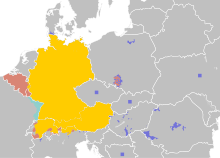
Back Агерман бызшәа Abkhazian Bahsa Jeureuman ACE Германыбзэ ADY Duits Afrikaans Deutsche Sprache ALS ጀርመንኛ Amharic Idioma alemán AN Þēodsc sprǣc ANG जर्मन भाषा ANP اللغة الألمانية Arabic
German (German: Deutsch) is a West Germanic language. It is spoken in Germany, Austria, Switzerland, Liechtenstein and Luxembourg; natively by around 100 million people. It is the most widely spoken mother tongue in the first language. There are some people who speak German in Belgium, the Netherlands, France and Northern Italy. There are people who speak German in many countries, including the United States and Canada, where many people emigrated from Germany. It is also spoken in Eastern Europe, Bulgaria, Romania, and Russia.
German is a part of the West Germanic language family and is much like English and Dutch. Much of the vocabulary in German is related to English, but the grammar is more complicated.[4]
German has a system of cases, and when helping verbs are used, the main part of the verb must be moved to the end of the sentence. For example, "Someone has stolen my car" is Jemand hat mein Auto gestohlen ("Someone has my car stolen"), and "Someone called me last night" is Jemand hat mich letzte Nacht angerufen ("Someone has me last night called").
In writing, every noun must start with a capital letter. German is the only language that still has that rule, but Danish and English did so a long time ago.
Standard German is an official language in Switzerland, but the Swiss dialect of German is difficult to understand for native speakers from Germany and even for Swiss who are not native to speaking German.[5] One reason that the dialects are still so different today is that even if Switzerland adopted Standard German, mostly as a written standard, German Swiss in World War II wanted to separate themselves from the Nazis by choosing to speak dialect over the Standard German.[6]
Swiss German also has some differences in spelling, for example, the letter ß, which is used only in German, is replaced by ss.

- ↑ Mikael Parkvall, "Världens 100 största språk 2010" (The World's 100 Largest Languages in 2010), in Nationalencyklopedin
- ↑ 2.0 2.1 2.2 Ammon, Ulrich (November 2014). Die Stellung der deutschen Sprache in der Welt (in German) (1st ed.). Berlin, Germany: de Gruyter. ISBN 978-3-11-019298-8. Retrieved 24 July 2015.[page needed]
- ↑ "Rat für deutsche Rechtschreibung – Über den Rat". Rechtschreibrat.ids-mannheim.de. Archived from the original on 26 December 2018. Retrieved 11 October 2010.
- ↑ Up, Topics. "Japanese vs German". Archived from the original on 2023-05-31.
- ↑ "German Numbers: Learn To Count From 0 To 1,000+". Language Throne. 2020-10-01. Retrieved 2021-09-09.
- ↑ "Languages of Switzerland". YouTube. Archived from the original on 2016-09-09.
<ref group=lower-alpha> tags or {{efn}} templates on this page, but the references will not show without a {{reflist|group=lower-alpha}} template or {{notelist}} template (see the help page).

